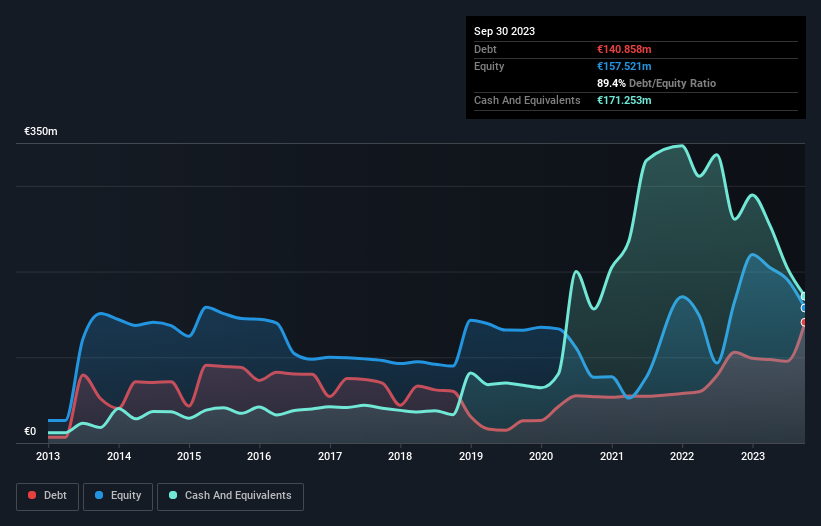Valneva (EPA:VLA) Has Debt But No Earnings; Should You Worry?
Some say volatility, rather than debt, is the best way to think about risk as an investor, but Warren Buffett famously said that 'Volatility is far from synonymous with risk.' So it seems the smart money knows that debt - which is usually involved in bankruptcies - is a very important factor, when you assess how risky a company is. Importantly, Valneva SE (EPA:VLA) does carry debt. But the more important question is: how much risk is that debt creating?
Why Does Debt Bring Risk?
Generally speaking, debt only becomes a real problem when a company can't easily pay it off, either by raising capital or with its own cash flow. If things get really bad, the lenders can take control of the business. However, a more common (but still painful) scenario is that it has to raise new equity capital at a low price, thus permanently diluting shareholders. By replacing dilution, though, debt can be an extremely good tool for businesses that need capital to invest in growth at high rates of return. The first step when considering a company's debt levels is to consider its cash and debt together.
See our latest analysis for Valneva
What Is Valneva's Net Debt?
As you can see below, at the end of September 2023, Valneva had €140.9m of debt, up from €105.9m a year ago. Click the image for more detail. But on the other hand it also has €171.3m in cash, leading to a €30.4m net cash position.

How Strong Is Valneva's Balance Sheet?
The latest balance sheet data shows that Valneva had liabilities of €218.2m due within a year, and liabilities of €144.9m falling due after that. Offsetting this, it had €171.3m in cash and €44.3m in receivables that were due within 12 months. So it has liabilities totalling €147.4m more than its cash and near-term receivables, combined.
This deficit isn't so bad because Valneva is worth €666.2m, and thus could probably raise enough capital to shore up its balance sheet, if the need arose. However, it is still worthwhile taking a close look at its ability to pay off debt. Despite its noteworthy liabilities, Valneva boasts net cash, so it's fair to say it does not have a heavy debt load! The balance sheet is clearly the area to focus on when you are analysing debt. But it is future earnings, more than anything, that will determine Valneva's ability to maintain a healthy balance sheet going forward. So if you're focused on the future you can check out this free report showing analyst profit forecasts.
In the last year Valneva had a loss before interest and tax, and actually shrunk its revenue by 49%, to €223m. To be frank that doesn't bode well.
So How Risky Is Valneva?
Statistically speaking companies that lose money are riskier than those that make money. And in the last year Valneva had an earnings before interest and tax (EBIT) loss, truth be told. And over the same period it saw negative free cash outflow of €208m and booked a €113m accounting loss. But the saving grace is the €30.4m on the balance sheet. That means it could keep spending at its current rate for more than two years. Overall, we'd say the stock is a bit risky, and we're usually very cautious until we see positive free cash flow. There's no doubt that we learn most about debt from the balance sheet. However, not all investment risk resides within the balance sheet - far from it. Be aware that Valneva is showing 2 warning signs in our investment analysis , you should know about...
When all is said and done, sometimes its easier to focus on companies that don't even need debt. Readers can access a list of growth stocks with zero net debt 100% free, right now.
New: Manage All Your Stock Portfolios in One Place
We've created the ultimate portfolio companion for stock investors, and it's free.
• Connect an unlimited number of Portfolios and see your total in one currency
• Be alerted to new Warning Signs or Risks via email or mobile
• Track the Fair Value of your stocks
Have feedback on this article? Concerned about the content? Get in touch with us directly. Alternatively, email editorial-team (at) simplywallst.com.
This article by Simply Wall St is general in nature. We provide commentary based on historical data and analyst forecasts only using an unbiased methodology and our articles are not intended to be financial advice. It does not constitute a recommendation to buy or sell any stock, and does not take account of your objectives, or your financial situation. We aim to bring you long-term focused analysis driven by fundamental data. Note that our analysis may not factor in the latest price-sensitive company announcements or qualitative material. Simply Wall St has no position in any stocks mentioned.
About ENXTPA:VLA
Valneva
A specialty vaccine company, develops, manufactures, and commercializes prophylactic vaccines for infectious diseases with unmet needs.
High growth potential and good value.
Similar Companies
Market Insights
Community Narratives




